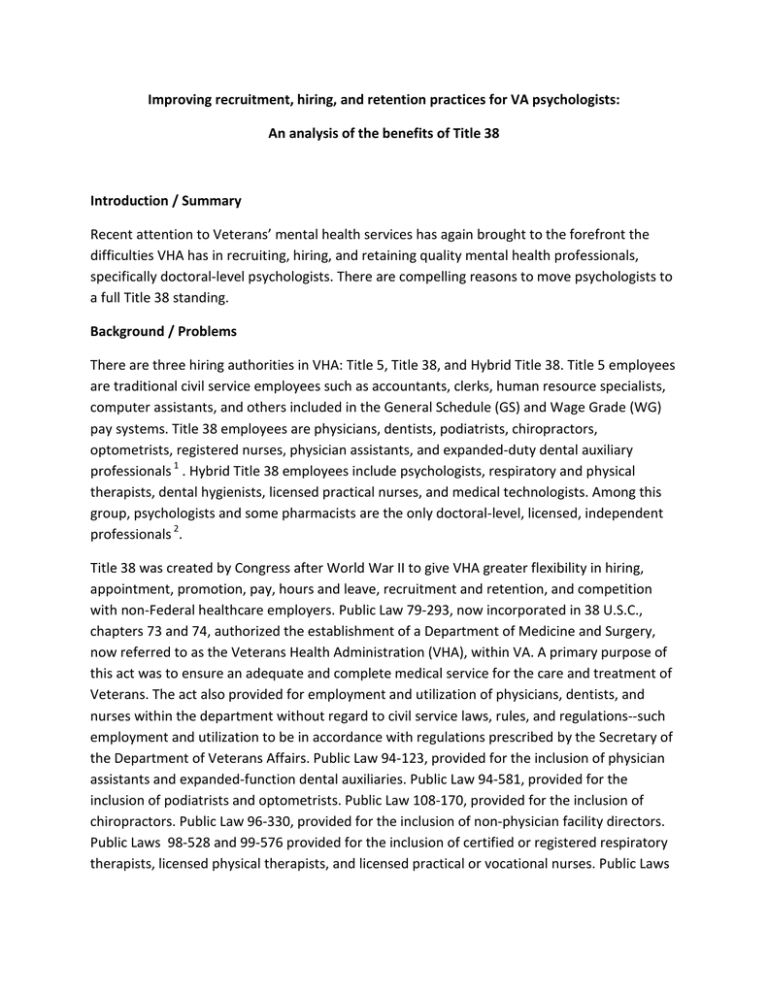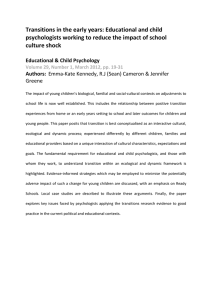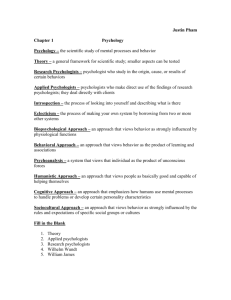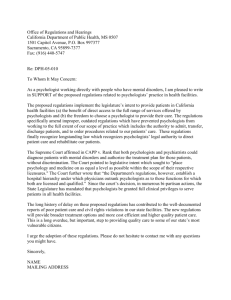Improving recruitment, hiring, and retention practices for VA
advertisement

Improving recruitment, hiring, and retention practices for VA psychologists: An analysis of the benefits of Title 38 Introduction / Summary Recent attention to Veterans’ mental health services has again brought to the forefront the difficulties VHA has in recruiting, hiring, and retaining quality mental health professionals, specifically doctoral-level psychologists. There are compelling reasons to move psychologists to a full Title 38 standing. Background / Problems There are three hiring authorities in VHA: Title 5, Title 38, and Hybrid Title 38. Title 5 employees are traditional civil service employees such as accountants, clerks, human resource specialists, computer assistants, and others included in the General Schedule (GS) and Wage Grade (WG) pay systems. Title 38 employees are physicians, dentists, podiatrists, chiropractors, optometrists, registered nurses, physician assistants, and expanded-duty dental auxiliary professionals 1 . Hybrid Title 38 employees include psychologists, respiratory and physical therapists, dental hygienists, licensed practical nurses, and medical technologists. Among this group, psychologists and some pharmacists are the only doctoral-level, licensed, independent professionals 2. Title 38 was created by Congress after World War II to give VHA greater flexibility in hiring, appointment, promotion, pay, hours and leave, recruitment and retention, and competition with non-Federal healthcare employers. Public Law 79-293, now incorporated in 38 U.S.C., chapters 73 and 74, authorized the establishment of a Department of Medicine and Surgery, now referred to as the Veterans Health Administration (VHA), within VA. A primary purpose of this act was to ensure an adequate and complete medical service for the care and treatment of Veterans. The act also provided for employment and utilization of physicians, dentists, and nurses within the department without regard to civil service laws, rules, and regulations--such employment and utilization to be in accordance with regulations prescribed by the Secretary of the Department of Veterans Affairs. Public Law 94-123, provided for the inclusion of physician assistants and expanded-function dental auxiliaries. Public Law 94-581, provided for the inclusion of podiatrists and optometrists. Public Law 108-170, provided for the inclusion of chiropractors. Public Law 96-330, provided for the inclusion of non-physician facility directors. Public Laws 98-528 and 99-576 provided for the inclusion of certified or registered respiratory therapists, licensed physical therapists, and licensed practical or vocational nurses. Public Laws 100-322 and 100-687, provided for the inclusion of authorities for the appointment, qualifications, advancement, and pay of pharmacists and occupational therapists. 3 In 1983, Public Law 98-160 provided for the inclusion of authorities for the appointment, qualifications, advancement, and pay of certified clinical or counseling psychologists who hold diplomas or Diplomates from an accrediting authority approved by the Secretary. 3 Although this law would have allowed some psychologists to be included under Title 38, the (then) Secretary/Administrator of Veterans Affairs (Harry N. Walters) declined to implement this change, because it would have created two classes of psychologists in VA, wherein only psychologists who held Diplomate status (i.e., board certification) could be included in Title 38, while all others would remain in Title 5. Psychologists remained under Title 5 until 2003, when Public Law 108-170 converted twentyone Title 5 positions to Hybrid Title 38 positions, including psychologists. The Hybrid Title 38 specifies use of Title 38 rules for certain hiring and promotion practices, but Title 5 for all other purposes. 4 At that time, psychologists were largely in favor of this classification due to Title 38 restrictions on off-tour outside employment--a common practice for VA psychologists. Since the creation of Hybrid Title 38 however, amendments have been added to Title 38, including an expansion of eligibility for outside employment during off-tour hours. These revisions now make Title 38 the appropriate classification for psychology. The move to Title 38 would give psychologists parity with all other doctoral-level providers in VA. Greater numbers of psychologists are needed by VA now than at any time in VA history. Despite the recent growth of mental health service in VA over the past 3 years, 5 psychologists are still within the top five shortages in VA, according to the recent Office of Inspector General study. 6 With the increase in demands for psychological care resulting from the growing Veteran population who served in Iraq and Afghanistan as well as the increases in problems now experienced by Korea and Vietnam Veterans, psychologists must be hired and retained to meet those treatment demands. Recruitment to VA has been a challenge for several reasons. First, cumbersome hiring practices including Title 5’s inability to use viable market salary levels makes VA less competitive compared to other psychologist employment opportunities. Reducing the constraints on psychologist hiring practices, such as allowing open certifications (“certs”) for positions and regional salary guidelines, for example, would enhance the attraction and retention of quality psychologists. Additionally, the current Hybrid Title 38 hiring process can easily take 6 months or more, resulting in many talented psychologists opting for positions with other organizations. Increasing numbers of experienced psychologists are now drawn to employment options outside VA, despite a general support in the field of Veterans and their service. A second problem in recruiting psychologists is the overall pay scale for psychologists in public service. According to the Dept. of Labor Statistics, psychologists are the highest-credentialed lowest paid doctoral level providers in the country. Finally, within the current federal GS pay scale, psychologists reach the top of their full performance level for pay (GS 13, step 10) in 21 years or fewer, with no means of advancement ever again, unless they leave clinical practice and move into administration. (See Appendix A.) Thus, many of our most experienced and talented psychologists are drawn to other positions outside VA while at the top of their careers. Comparing the pay scales of psychologists within VA to those, for example, in academic settings, shows that VA psychologists at the full performance level (GS-13) have average salaries that are approximately 74% of their academic peers. By 21 years, VA psychologists are earning only about 70% of their academic peers. (See Appendices A and B.) Hybrid Title 38 allow for some flexibility in compensation according to individual talents and skills, within narrow parameters. However, many administrators still consider psychologists as Title 5 positions and equate them to administrators rather than to other highly-skilled clinicians. The work of psychologists is invaluable to the mission of the VA. Research has repeatedly shown that psychotherapy is extremely effective in treating the most common MH issues our Veterans face, including PTSD, suicidality, depression, and anxiety.7 Despite the current push to hire more VA psychiatrists, research continually shows that for almost all mental health issues, psychotherapy is superior to medications, especially over time. Moreover, even in cases of serious mental illness, research shows that medications plus psychotherapy is the best treatment and aids in medication adherence.8,9 Psychologists’ training encompasses a unique combination of assessment, therapy, and research skills needed to develop and implement new and effective treatments. Our Veterans frequently have highly complex mental health problems, including posttraumatic stress disorder and traumatic brain injury with multiple comorbidities as well as the more common problems such as substance abuse and depression. VA psychologists have become particularly adept at treatments at a level above that which is generally available elsewhere, utilizing state-of-the-art, evidence-based approaches to treatment of mental illnesses. Retaining psychologists who demonstrate excellence in treating Veterans is a more critical issue than ever before. Title 38 would allow for appropriate compensation to retain this talented workforce. Solution Title 5 is graded by position. Title 38 positions are graded by person. As a result, Title 38 allows for specific recruitment incentives and scaling of salary to reflect individual skills and talents. Pay for an individual is based on a combination of market pay, base pay, specialty pay, and performance pay. For physicians and dentists (Title 38 providers), market pay reflects the recruitment and retention needs for the specialty or assignment of a provider at a VA facility. At least once every two years, the Secretary prescribes nationwide minimum and maximum amounts of annual pay (base pay plus market pay) that will be paid. In determining pay ranges, at least two or more national surveys of pay for Title 38 providers are consulted. National surveys include data that describes overall physician and dentist income by specialization or assignment and benefits in broad geographic scope. Local Pay panels determine the pay based on market pay, base pay and specialty. Tier levels are used to determine maximum levels of pay. Performance pay is separate from salary. It is based on pre-established performance metrics for the individual physician. If met, that physician receives performance pay of up to 7.5% or $15,000 per year. Hybrid Title 38 positions are also graded by person. However, the parameters are narrow and the ceiling is low. Allowing psychologists to set salary level according to individual providers’ strengths, talents, and specialties would greatly improve recruitment and retention of highly skilled psychologists. Appendix B shows the average salaries of psychologists in doctoral-level graduate training programs, by number of years as a full professor (the full performance level for a psychologist in that setting). Of note, academic salaries are for a 9-10 month work year. The last column in the table shows the extrapolated salaries if these were 12-month positions. It is very difficult to ascertain the average salaries of psychologists in independent practice, though it is nearly certain that their compensation would be higher than the average public sector or academic psychologist. Appreciation is noted for the change to hiring practices for certain professions in Section 301 § 7412(b) of the Veterans Access, Choice, and Accountability Act of 2014 allowing for direct appointment of occupations which are deemed to have staffing shortages, which in 2015, includes psychologists. 10 However, remaining in a Hybrid 38 position leaves psychologists vulnerable to losing those expedited hiring practices in the future. A move to Title 38 will help to insure that psychologists will be attracted to VA and stay at VA throughout their careers. Conclusion In summary, there is convincing rationale for moving psychologists from Hybrid Title 38 designation to straight Title 38. Such a move by Congress will give VA added flexibility related to the recruiting and hiring of psychologists, will enhance the recruitment of the most qualified of the new generation of psychologists to VA, and will heighten the probability that experienced practitioners, knowledgeable in the treatment of Veterans with complex difficulties, will come to and remain with VA, to continue our mission of providing the best care available to our Nation’s Veterans. Works Cited 1 VA Pamphlet 05-68 (2011, March). Master Agreement between the Department of Veterans Affairs and the American Federation of Government Employees. 2 Burk, Jeffrey. (2009, May). Update on Implementation of Hybrid Title 38 Authority in VA. VA Psychology Leadership Conference, San Antonio. 3 VA Directive 5001/1 (2004, June 16). System of VA Human Resources Management Directives and Handbooks, General Introduction and Administration. 4 VA Handbook 5007/15 (2004, November 26). Pay Administration. 5 VA Announces Aggressive National Recruitment Effort to Hire Mental Health Professionals June 11, 2012. http://www.va.gov/opa/pressrel/pressrelease.cfm?id=2325 6 Dept. of Veterans Affairs Office of Inspector General, Office of Healthcare Inspections, Report No. 15-00430-103 OIG Determination of Veterans Health Administration’s Occupational Staffing Shortages http://www.va.gov/oig/pubs/VAOIG-15-00430-103.pdf 7 Dept. of Veterans Affairs, VA Research Currents (2015, Feb 4). Group therapy shows promise for suicidal Veterans. http://www.research.va.gov/currents/winter2015/winter2015-14.cfm 8 Effective Treatments for PTSD patient education brochure. http://www.ptsd.va.gov 9 Benzodiazepines and PTSD patient education brochure. http://www.ptsd.va.gov 10 Dept. of Veterans Affairs office of Inspector General, office of Healthcare Inspections, Report No. 15-00430-103 http://www.va.gov/oig/pubs/VAOIG-15-00430-103.pdf Appendix A. Pay rates for VA psychologists versus Title 38 employees Psychologists under Hybrid 38: Following 2 years of post-doctoral experience and achievement of a license for independent practice, a psychologist may achieve GS-13 status. From there, the psychologist’s career ladder is determined primarily on time in grade, though some acceleration of steps is possible on an individual basis. Year 1 Year 2 Year 3 Year 4-5 Year 6-7 Year 8-9 Year 10-12 Year 13-15 Year 16-18 Year 19 GS-13/1 GS 13/2 GS 13/3 GS 13/4 GS 13/5 GS 13/6 GS 13/7 GS 13/8 GS 13/9 GS 13/10 2014 Salary (Rest of US) 82,642 85,396 88,151 90,906 93,660 96,415 99,170 101,924 104,679 107,434 Title 38 pay computation: Market pay + base pay + specialty pay + performance pay Nurses, physician assistants and expanded-duty dental auxiliary professionals get shift differential of 10% pay and weekend differential of 25% pay. Other Title 38 professions are compensated for differentials within their negotiated performance pay. B. Average salary for US full-time professors in doctoral departments of psychology by years in rank Median Salary a Faculty full professor < 3 years Faculty full professor 3-5 years Faculty full professor 6-11 years Faculty full professor 12-17 years Faculty full professor 18-23 years Faculty full professor 24+ years 2014 92,035 for a 9-10 month year 105,423 for a 9-10 month year 108,592 for a 9-10 month year 115,360 for a 9-10 month year 126,000 for a 9-10 month year 138,875 for a 9-10 month year 2013 98,959 for a 9-10 month year 101,384 for a 9-10 month year 104,606 for a 9-10 month year 111,096 for a 9-10 month year 127,234 for a 9-10 month year 136,410 for a 9-10 month year 1.22 multiplier b 112,283 128,616 132,482 140,739 153,720 169,428 a 2012-2013 and 2013-2014 Faculty Salary Surveys, APA Center for Workforce Studies and Council of Graduate Departments of Psychology. b The majority of tables report salaries for faculty in U.S. graduate departments of psychology on a 9-10 month basis. Some departments (e.g., professional schools of psychology and departments of psychology in medical schools), however, typically operate on an 11-12 month academic calendar. In these cases, the 9-10 month salaries can be converted to their 11-12 month equivalents by multiplying by 11/9. This total is reflected in the 4th column, above.







